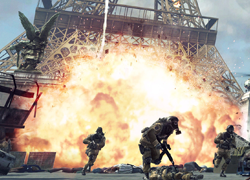Despite the fact that I am a law student with an Evidence final tomorrow, I had to take a minute and write about a development that would be hilarious if it were not so damaging. At the 31st International Conference of the Red Cross and Red Crescent in Geneva, members of the ICRC discussed whether realistic war video games like Call of Duty 3: Modern Warfare(read, Call of Duty 3: Modern Armed Conflict) should be bound by international humanitarian law. This debate, if one can properly classify it as such, was initiated by the Geneva-based human rights organizations TRIAL and Pro Juventute several years ago, but it did not gain any meaningful traction until it was picked up and legitimized by the ICRC, which is charged with ensuring that actual humanitarian law (IHL), happening in what now must be referred to as “First Life,” is upheld.

What makes this discussion truly ridiculous is the manner in which the ICRC is characterizing the legal issues surrounding video games realistically depicting armed conflict. The ICRC is not objecting to such games on the grounds that they expose minors or some other impressionable group to violence. Rather, it argues that the mere fact that actions outlawed by IHL are allowed with impunity when virtually performed by gamers is a violation of ILH itself. It asserts that video game manufacturers should be legally required to reflect legal norms of war when designing their games. Under this logic, the makers of Grand Theft Auto: Vice City were enabling thieves, murderers, and frequent solicitors of prostitution. Makers of The Godfather 2 are part of a racketeering conspiracy.
In the real world, the strength of international humanitarian law is put to the test during every armed conflict, and, despite the ICRC’s best efforts, it is not always upheld. In fact, the United States is currently in the middle of a public debate about whether or not certain actions by the US Government in its global war on terror should be deemed legal. Those familiar with international humanitarian law know that the legal answer to these questions is clear, but opponents argue that IHL, strictly construed, is naïve idealism unworthy of consideration by those with their finger on the proverbial red button. Discussions like this one give credence to that wrongheaded view, and the ICRC is significantly contributing to the distortion of public opinion when it takes what was once the musing of two human rights groups in Geneva and catapults it to the public spotlight.
On second thought, maybe this should be seen as an employment opportunity for international lawyers. Video game manufacturers are going to need someone to write the scripts for all those virtual war crimes tribunals.


